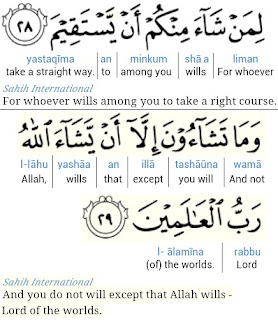(Arabic: سورة التكوير, “The Overthrowing”).
It is derived from the word kuwwirat in the first verse. Kuwwirat is passive voice from takwir in the past tense, and means "that which is folded up", thereby implying that it is a Surah in which the "folding up" has been mentioned.
This is the 81st surah of the Qur'an with 29 ayaat.
THEME AND SUBJECT MATTER
It has two themes: the Hereafter and the institution of Prophethood.
In the first six ayah, the first stage of the Resurrection has been mentioned when the sun will fold up, the stars will scatter, the mountains will disappear, the beasts of the jungle will be stupefied and will gather together, and the seas will boil up.
Then in the next seven ayah, the second stage has been described when the souls will be reunited with the bodies, the records will be laid open, the people will be called to account for their crimes, the heavens will be unveiled, and Hell and Heaven will be brought into full view.
The condemnation of female infanticide was revealed in 8th and 9th ayah of this surah. After depicting the Hereafter thus, man has been left to ponder his own self and deeds, saying: "Then each man shall himself know what he has brought with him."
After this the theme of Prophet hood has been taken up. In this the people of Makkah have been addressed, as if to say "Whatever prophet Muhammad (salAllahu 'alaihi wa sallam) is presenting before you, is not the bragging of a madman, nor an evil suggestion inspired by Shaytaan, but the word of a noble, exalted and trustworthy messenger sent by Allah, whom Muhammad (salAllahu 'alaihi wa sallam) has seen with his own eyes in the bright horizon of the clear sky.










No comments:
Post a Comment